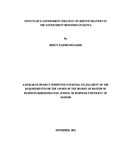| dc.description.abstract | E-government involves using ICTs to transform both back-end and front-end government
processes and provides services, information and knowledge to the public. The
emergence of Information and Communication Technology has provided means for faster
and better communication, efficient storage, retrieval and processing of data and
exchange and utilization of information to its users, be they individuals, groups,
businesses, organizations or governments. The objective of the study was to investigate
the effects of e-government strategy on service delivery in the government ministries.
The study adopted a descriptive survey research design. The target population comprised
of all Government Ministries in Kenya were by census was conducted. The data was
collected using questionnaires which comprised of both open and closed ended questions.
The data was analyzed using Statistical Package for Social Sciences (SPSS) and
presented in the form of tables, frequencies and percentages. The research findings
revealed that implementation of e-government were not effective in all Ministries. The
study revealed that use of e-government enabled database sharing, lowered the costs of
delivering services, reduced time taken to process a transaction, lead to improved
management of records, eased working procedure and improved staff productivity. The
study revealed the existence of overcrowding in ministries, and inability by citizens to
access facilities online. The study recommends enactment of policies aimed at regulating
of e-government implementation. the study recommend that management teams
responsible for e-government implementation at the ministries should ensure that the egovernment
implementation process leads to promoting online access of facilities by the
citizen as well as reducing overcrowding in the Ministries. | en_US |

